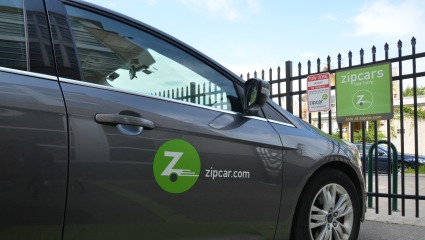
The Living Green initiative has spread throughout Wayne State University, increasing environmental sustainability around the Midtown campus. Through a series of initiatives from various colleges and departments, Wayne State has focused on energy conservation measures, waste reduction, and behavioral change practices that positively impact the social, economic and environmental sustainability of the university.
The projects listed below represent a small portion of WSU's Living Green initiatives. Through these efforts, Wayne State seeks to create a culture of sustainability. The campus community is encouraged to implement practices aimed toward reducing greenhouse gas emissions through energy conservation, waste reduction and alternative transportation use, as well as academic and community engagement. A complete list of these practices can be found on the sustainability website, livinggreen.wayne.edu. Volunteer opportunities are also available for individuals and groups interested in actively participating in WSU's Living Green initiative.
Living Green features the following initiatives, which include:
Academic and community engagement
"¢ The Urban Watershed Environmental Research Group is a collaboration of Wayne State University researchers networked with the community to focus on water in the urban and future impacts of human culture on community, ecosystem and economic health.
"¢ The SEED Wayne Fellowship program seeks to enhance the knowledge of graduate students in community food systems and basic competencies in community food sustainability and justice work.
"¢ The Wayne State University Farmers Market offers a range of farm-fresh and prepared foods from throughout the city and region. Market season runs Wednesdays from June through October.
"¢ The Sustainability Scholars organization is an interdisciplinary research working group focused on the study of sustainability.
Alternative transportation
"¢ Wayne State has installed 12 charging stations for electric vehicles in select parking lots and structures around campus.
"¢ The campus shuttle services both main and medical campuses, allowing the WSU community to easily move around Midtown.
"¢ The university hosts several bike events throughout the year to encourage biking and alternative transportation.
"¢ The campus features miles of bike lanes and numerous bike racks to secure and facilitate ease of bicycle use for the campus community. Biking activities include the Baroudeur cycling event and Green Ride sustainability tour.
"¢ Zipcar car share vehicles are strategically located around campus.
"¢ The QLINE light rail construction is nearing completion. The rail service - connecting downtown, Midtown and New Center - will have several stops on or near the Wayne State campus.
Energy conservation initiatives
"¢ Campuswide replacement of T8 fluorescent bulbs with more efficient LED tube lighting.
"¢ The Academic and Administration Building, the David Adamany Undergraduate Library, and Elliman have been entered in Battle of the Buildings, a statewide energy competition that calls for participants to seek greater energy reductions than other participants.
"¢ Heating, ventilation and air conditioning upgrades are occurring at various buildings across campus.
"¢ Steam trap repairs and replacements help prevent the loss of steam, allowing greater efficiency within building heating systems.
"¢ Sensors and controls improvements enhance building systems that measure temperature, yielding greater energy efficiencies.
"¢ Water-efficient fixtures allow greater water savings and a reduction in associated energy costs.
Waste reduction initiatives
"¢ Last year, WSU recycled over 400 tons of cardboard, 120 tons of paper, 12 tons of plastic, 10 tons of aluminum and 17 tons of scrap metal.
"¢ Green recycling bins are strategically placed to conveniently accept recyclables in campus buildings.
"¢ Warrior Exchange allows departments to post or view unwanted university property and equipment.
"¢ Hydration stations (reusable water bottle filling fountains) have kept more than 250,000 plastic water bottles out of the waste stream since fall 2012.
"¢ More than 2,200 pounds in printer cartridges have been recycled or reused since November 2013.
"¢ WSU has collected over 1.8 million pounds in e-waste since 2010.
For more information on the initiatives listed above, please visit livinggreen.wayne.edu or email daryl.pierson@wayne.edu. You will also find more information about sustainability, learn about volunteer opportunities or find ways that you can implement Living Green practices to do your part in making WSU an environmentally friendly campus.
